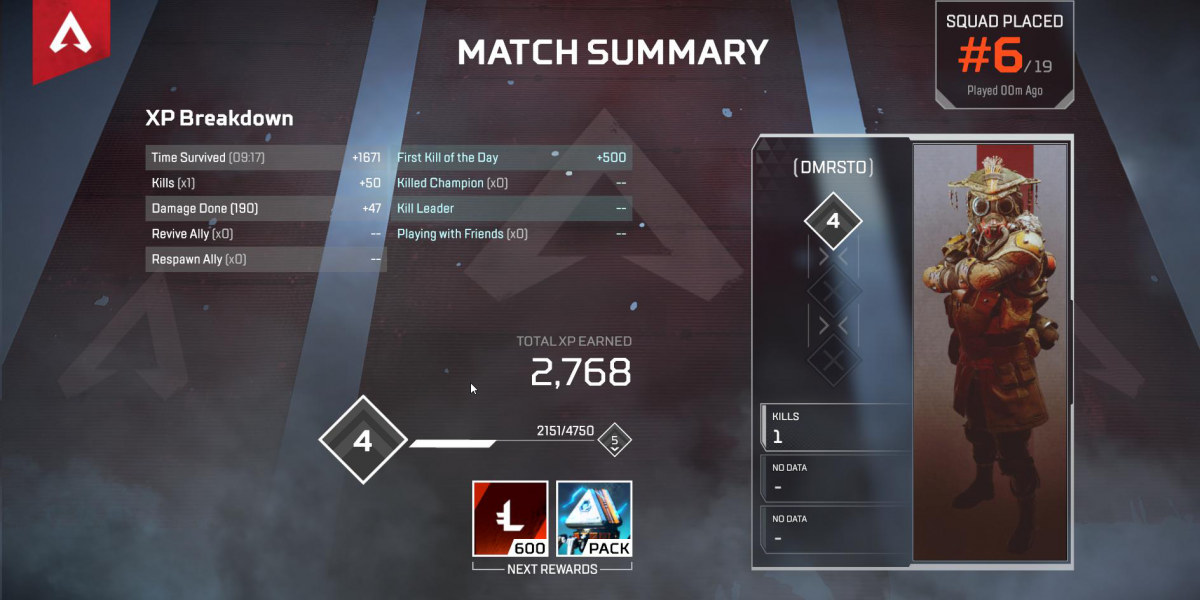Battle Royale games make me feel old.
As a genre, I can understand their appeal — it’s a mix of randomized gameplay, quick queues, and the ability to shrug off losses in a very rapid fashion. However, when Apex Legends came out, I really thought it’d be like a lot of later entries to the genre, which never really caught my interest like the initial burst of PLAYERUNKNOWN’s BattleGrounds did.
A week or so later, I can firmly say that I’m into Apex Legends, and frankly, that weirds me a bit out. I’ve written in the past about how my enthusiasm for picking up new things waxes and wanes, and seeing how I react to the game causes me to look back and examine that kind of thing again.
When I first started playing, the thing that stood out to me was the degree to which it learned from other titles in the genre. While PUBG remains a hacked-together mess of purchased and new assets, and Fornite originally was something completely different, Apex Legends feels like it adapted Respawn’s previous title, Titanfall 2, with the specific intention of it to fit the Battle Royale genre.
I picked up Titanfall 2 out of almost solidarity for its release in a terrible window between Call of Duty: WWII and Battlefield 1; I felt it deserved better, and I have a bit of a soft spot for near-future aesthetics (like Battlefield: 2142). After playing both its single player and multiplayer offerings, I can understand why Apex succeeds while it failed: Apex is easier to get into, and the polish it provides when it comes to communication and working within a team unit is vastly improved.
When I played a couple matches with my friend, all we could talk about was the ping system. I’ve had the same discussions with randoms, people on Twitter, and listened to it talked about on podcasts. It makes it so much easier to play in a solo environment (where you’re matched with randoms) and offers a convenient shortcut to many of the calls and information that would normally go through chat or voice.
I can ping where I’m going, where I want to go, whether I agree with other pings or not, or whether I want to claim items that my teammates have pinged. If I make a mistake, I can cancel those pings, and my character will say “cancel that” in a way that my teammates can use.
This alone makes the game as a whole stand out. It adds on top of a lot of other systems that feel smoother than other titles. For some reason, I was mystified that I only needed to click weapon attachments and inventory items once to drop them. I was impressed that the game automatically will switch out items for better versions, and refuse to let you pick up inferior ones by mistake.
I was sitting there, thinking “wow, with this, it’s evident how much time and awkwardness I’m spending dragging things around in other UIs in PUBG or Fortnite, and how little that actually matters in the grand scheme of things.”
Being able to have that level of quality of life means that the player is more focused on the looting, the shooting, the map, and the appreciation for the aesthetic that Respawn have crafted. While the game can be a bit janky at times (especially when clashing with Origin, EA’s online platform), it feels polished and made with purpose.
Not content to just abandon the Titanfall universe that they built, the lore of Apex Legends takes place in the same setting. This makes sense, and almost mirrors the original transition from Unreal to Unreal Tournament that Epic Games made in the late 90s. Apex Legends is probably what UT would be if it was made today.
This feels welcoming, and a pleasant medium in intensity between the hyper-realistic PUBG aesthetic and the cartoony Fornite. It’s punchy and mature without being grimdark, and the characters are furnished enough to provide you with personality and something to connect with.
Despite all this, I keep drifting back to that ping system. For the older gamer like me, it reflects a shift in how I spend my time, and how I value the time that I put into competitive titles like this one. I noticed with PUBG that almost immediately you needed to have a good group to play with, because unless you liked playing Solo, you needed communication to be effective.
If you weren’t playing solo, you weren’t getting better, which means that your teammates could pull ahead of you in skill, and effectively leave you behind. Since they did that, you wouldn’t have people to play with, and since you didn’t like to play Solo, you wouldn’t improve to catch up.
This is definitely not exclusive to Battle Royales, and is becoming more and more of a symptom of online environments as most of my relationships and networking opportunities are online and at a distance. With Apex Legends, all those quality-of-life changes actually made playing solo (which will place you in a party — you cannot play as a single person, barring connection iuees) enjoyable.
I found myself queuing up by myself, playing a no-stakes game that will, over time, improve my skills and familiarity. I actually felt myself having fun, instead of like it was pulling teeth so that I could actually have fun, playing with the people I wanted to.
That speaks to a lot of things that are personal, rather than the game’s fault. I feel like getting myself to think about and realize why those issues all intersect is a net positive in the long run.
I’m not sure how long I’m going to stick with Apex — who knows, I might end up dropping it after I hit publish on this post — but it at least taught me how much those little things matter, and how it can fit into my schedule as a living, breathing game that takes effort to improve in.


Leave a Reply